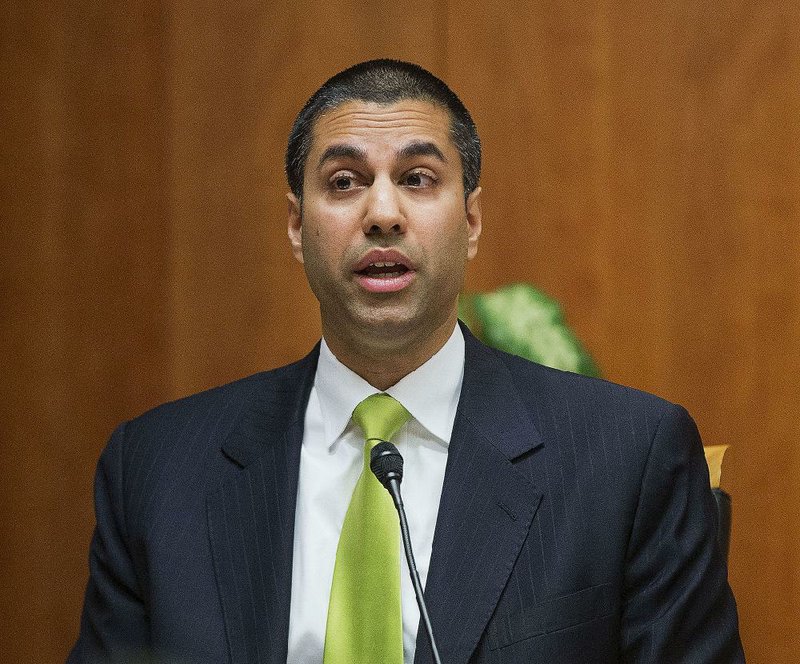WASHINGTON -- The chairman of the Federal Communications Commission on Tuesday proposed repealing net neutrality rules for online traffic, following through on a promise earlier this year to roll back the Obama-era regulations.
Ajit Pai, a Republican appointed by President Donald Trump, opposed the rules when they were enacted in 2014, when the FCC was controlled by Democrats.
"Under my proposal, the federal government will stop micromanaging the Internet," Pai said in a written statement.
"Instead, the FCC would simply require Internet service providers to be transparent about their practices so that consumers can buy the service plan that's best for them and entrepreneurs and other small businesses can have the technical information they need to innovate," he said.
Under Pai's plan, which he said would be publicly released today ahead of a Dec. 14 vote, the Federal Trade Commission would take over the job of policing Internet service providers for online privacy.
Pai called for a repeal in April, and the Republican-controlled FCC voted 2-1 along party lines a month later to begin a formal rule-making process.
The agency now has a 3-2 Republican majority. Pai's two Republican colleagues, Mike O'Rielly and Brendan Carr, are expected to support the repeal.
The agency received more than 22 million comments about the fate of the standing rules, which are supported by public interest groups and liberal activists but opposed by telecommunications companies and conservatives.
The rules prohibit AT&T Inc., Comcast Corp., Charter Communications Inc. and other Internet service providers from blocking websites, slowing connection speeds and charging extra for faster delivery of certain content.
To enforce the rules, the FCC classified broadband Internet service as a more highly regulated utility-like service under Title 2 of federal telecommunications law. That allowed some of the oversight to shift to the FCC from the Federal Trade Commission.
AT&T, other telecommunication companies and industry trade groups sued to block the rules, arguing that the FCC exceeded its authority in approving the regulations.
Last year, a federal appeals court upheld the regulations. The ruling could make it difficult for the FCC to repeal the net neutrality rules, and public interest groups are expected to challenge the move in court.
The expected adoption of the plan won't end a debate that's roiled the tech world for years. Aggrieved parties will try to save the regulations in federal court, where judges will decide whether the agency is within its rights to reverse a regulation it adopted little more than two years ago.
"There will be lawsuits -- that's a given," said James Gattuso, a senior research fellow at the Heritage Foundation in Washington.
A court last year upheld the FCC's 2015 decision to place broadband service providers under utility-style regulation. The FCC used that strong legal authority to bar the companies from slowing or blocking Web traffic or charging for faster passage across their networks. Two earlier attempts to regulate Web traffic were tossed by U.S. judges.
"Our current net neutrality rules are the product of a decade's worth of work and three trips to the court. They are court-tested and wildly popular," FCC Commissioner Jessica Rosenworcel, part of the agency's Democratic minority, said in an email before the proposal was announced. "To wipe them out now is foolhardy and short-sighted."
Legally, the FCC can reverse its rules if it has a good reason.
"You can change your mind so long as you justify it and explain why the policy has changed," said Christopher Yoo, a law professor at the University of Pennsylvania.
Gigi Sohn, who helped write the current rules as an FCC aide, said the case will turn on whether consumers view their broadband Internet access as some type of bundled service, replete with email and spam filters, or "as a big dumb pipe."
If it's a dumb pipe, Internet access is clearly a telecommunications service and the 2015 rules should stand, said Sohn.
Pai "is going to have to show that two-and-a-half years later people changed their mind, and that now they want more -- that they're looking for some bundle of services," Sohn said in an interview. "That's going to be tough for him to show."
The Internet Association, a group whose members include major Internet companies such as Google and Amazon, vowed to continue to fight to keep the current net neutrality rules intact.
"Consumers have little choice in their [Internet service provider], and service providers should not be allowed to use this gatekeeper position at the point of connection to discriminate against websites and apps," the group's Chief Executive Officer Michael Beckerman said in a Tuesday statement.
Consumers Union predicted that a repeal of net neutrality would allow service providers to raise their prices and give preferential treatment to certain sites and apps.
"Strong net neutrality rules are vital to consumers' everyday lives and essential to preserving the Internet as we know it today -- an open marketplace where websites large and small compete on equal terms and where information and ideas move freely," said Jonathan Schwantes, the advocacy group's senior policy counsel.
Broadband providers have argued that increased competition allowed by the proposed rules will ensure they don't unfairly squelch traffic.
"The removal of antiquated, restrictive regulations will pave the way for broadband network investment, expansion and upgrades," Jonathan Spalter, chief executive officer of the trade group USTelecom, said in an emailed statement.
Information for this article was contributed by Jim Puzzanghera of the Los Angeles Times; by Todd Shields, Jing Cao and Gerry Smith of Bloomberg News; and by Ryan Nakashina and Michael Liedtke of The Associated Press.
A Section on 11/22/2017
